Riforniri con l’idrogeno sarà possibile in futuro in tutta la Germania
• H2 Mobility Deutschland diventa operativa da una joint venture tra i sei partner industriali
• Via libera all’espansione graduale di stazioni di rifornimento H2 in Germania
• La Germania sulla strada per avere la prima rete di alimentazione H2 interregionale del mondo
• Il Ministro Federale dei Trasporti Dobrindt dà un ulteriore sostegno
Fonte: H2 Mobility
Berlino, Germania. 13 Ottobre 2015. Sei società industriali – Air Liquide, Daimler, Linde, OMV, Shell e Total – hanno formato una joint venture intersettoriale, H2 Mobility Deutschland GmbH & Co. KG.
La creazione della società in accomandita apre la strada ad una espansione graduale di stazioni di rifornimento di idrogeno (H2) in tutta la Germania, che porterà il totale a circa 400 entro il 2023.
La società con sede a Berlino ha iniziato le operazioni e sta lavorando intensamente in preparazione della terza parte della fase Uno dei piano d’azione comune.
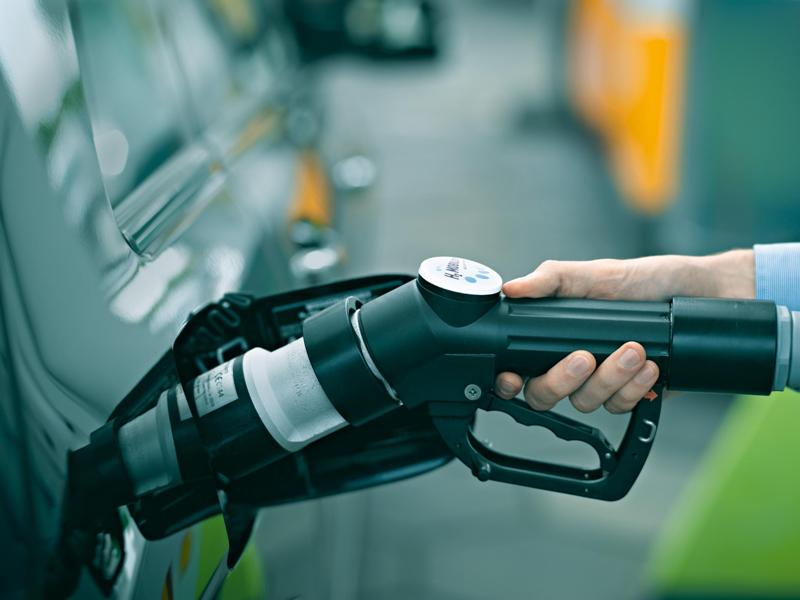 Questo prevede l’accelerazione per allestire 100 stazioni di servizio nel corso dei prossimi anni. Rappresentanti di alto livello della joint venture H2 Mobility si sono incontrati oggi nel lancio a colloqui avuti con il Ministro Federale dei Trasporti Alexander Dobrindt con il quale hanno messo a punto i prossimi passi.
Questo prevede l’accelerazione per allestire 100 stazioni di servizio nel corso dei prossimi anni. Rappresentanti di alto livello della joint venture H2 Mobility si sono incontrati oggi nel lancio a colloqui avuti con il Ministro Federale dei Trasporti Alexander Dobrindt con il quale hanno messo a punto i prossimi passi.
Le industrie partner ed il governo hanno rafforzato il loro impegno con la firma di un memorandum d’intesa sulle stazioni di rifornimento di idrogeno per la Germania.
Il Ministro federale Dobrindt:
“E-mobility deve essere emotiva e deve suscitare la passione per l’unità del futuro. I veicoli elettrici alimentati da celle a combustibile ad idrogeno offrono le migliori condizioni: Si dispone di una lunga autonomia e si può fare rifornimento in pochi minuti. Per il lancio sul mercato di questa tecnologia, ora abbiamo bisogno di una rete globale di stazioni di rifornimento dell’idrogeno. Pertanto, accolgo con favore i piani di H2 Mobility per costruire 400 stazioni di rifornimento di idrogeno in Germania entro il 2023”.
Il piano d’azione di H2 Mobility prevede una rete di stazioni di H2 in tutta la Germania entro il 2023, il che renderebbe la Germania il primo paese ad offrire una rete interregionale in cui i veicoli a celle a combustibile (FCEV) possono rifornirsi con l’idrogeno. Pertanto sono previsti investimenti per circa 400 milioni di euro in totale.
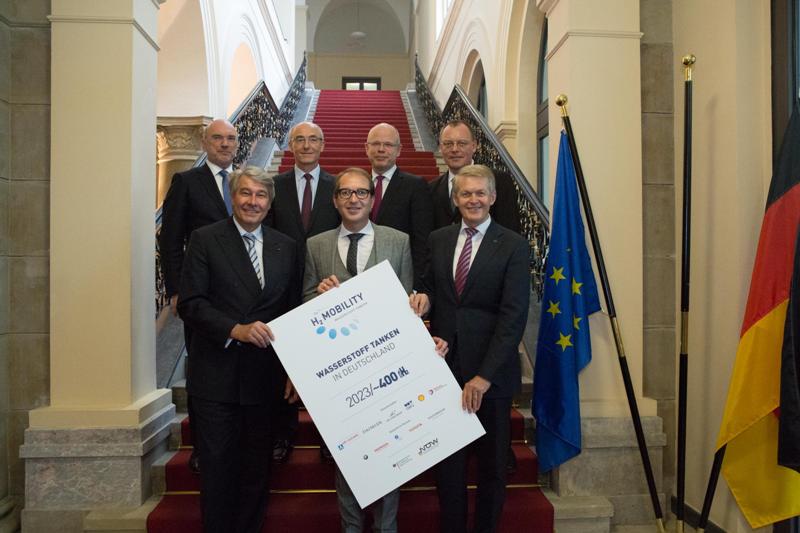 Come giocatore chiave industriale nel potenziamento delle infrastrutture di H2 in Germania, H2 Mobility e il suo amministratore delegato, Frank Sreball, sono responsabili per la costruzione e la gestione di una rete di stazione di rifornimento H2 in Germania.
Come giocatore chiave industriale nel potenziamento delle infrastrutture di H2 in Germania, H2 Mobility e il suo amministratore delegato, Frank Sreball, sono responsabili per la costruzione e la gestione di una rete di stazione di rifornimento H2 in Germania.
La joint venture costituisce anche parte integrante del progetto di ricerca per l’ulteriore sviluppo della mobilità a idrogeno. H2 Mobility è leader a livello internazionale e ha il potenziale per dare slancio ad altri paesi mentre si espandono la loro infrastruttura di idrogeno. Ad esempio, l’azienda è un membro della rete di recente formazione “Hydrogen Mobility Europe”.
I partner della joint venture hanno molti anni di esperienza nel settore della mobilità elettrica alimentata da celle a combustibile, tecnologia e infrastrutture di accumulo e di rifornimento, mentre i partner industriali hanno recentemente compiuto progressi significativi in materia di normazione.
Le prime case automobilistiche hanno già FCEVs in produzione per il mercato tedesco. Altre seguiranno prossimamente.
L’obiettivo dichiarato del governo federale è quello di rendere la Germania il principale mercato per le soluzioni di mobilità sostenibili e tecnologie efficienti. La mobilità elettrica con veicoli a celle a combustibile contribuirà a ridurre le emissioni di CO2 in maniera significativa – soprattutto quando si utilizza l’idrogeno da fonti di energia rinnovabili, come guidando FCEVs privo di emissioni locali.
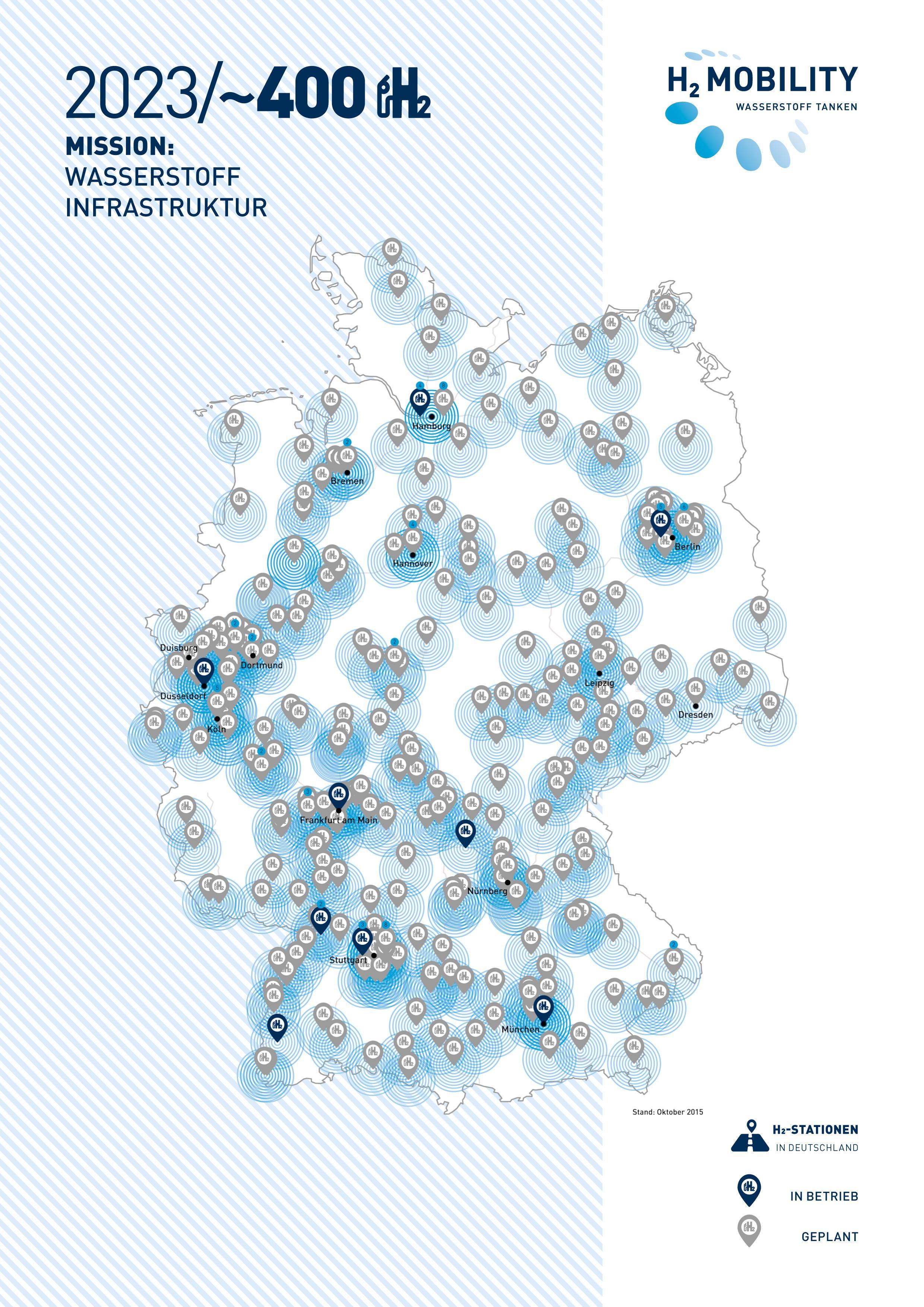 NOW GmbH, l’Organizzazione Nazionale per l’idrogeno e Fuel Cell Technology, sta monitorando da vicino il raggiungimento di questo obiettivo.
NOW GmbH, l’Organizzazione Nazionale per l’idrogeno e Fuel Cell Technology, sta monitorando da vicino il raggiungimento di questo obiettivo.
NOW è responsabile per il coordinamento dei programmi sotto l’egida del Ministero Federale dei trasporti e delle infrastrutture digitali per promuovere la mobilità delle celle a combustibile.
Numerosi partner associati sosterranno le attività di H2 Mobility.
Attraverso la consulenza H2 Mobility, i produttori di automobili BMW, Volkswagen, Honda e Toyota, così come la società di tecnologia Intelligent Energy sono coinvolte nella joint venture.
L’H2 Mobility è anche in stretta collaborazione con il Clean Energy Partnership * (CEP), il più grande progetto di mobilità a idrogeno in Europa.
* Membri CEP: Air Liquide, BMW, Daimler, EnBW, Ford, GM / Opel, Hamburger Hochbahn, Honda, Hyundai, Linde, Shell, Siemens, Stuttgarter Straßenbahnen SSB, Total, Toyota, OMV, Volkswagen e Westfalen Group.
In English
Filling up with hydrogen will be possible Germany-wide in future
- H2 Mobility Deutschland becomes operative as a joint venture between six industrial partners
- Go-ahead for staged expansion of H2 filling stations in Germany
- Germany on the way to having the world’s first inter-regional H2 supply network
- Federal Minister of Transport Dobrindt gives prospect of further support
Source: H2 Mobility
Berlin, Germany. October 13, 2015 – Six industrial companies – Air Liquide, Daimler, Linde, OMV, Shell and Total – have formed a cross-sector joint venture, H2 MOBILITY Deutschland GmbH & Co. KG. The creation of the limited partnership paves the way for a staged expansion of hydrogen (H2) filling stations across Germany, which will bring the total to around 400 by 2023.
The Berlin-based company has started operations and is working intensively in preparation for Stage One of the joint action plan. This envisages the accelerated set-up of 100 filling stations over the next few years. Senior representatives of the H2 MOBILITY venture partners met today at launch talks held with Federal Minister of Transport Alexander Dobrindt and discussed the next steps. The industry and government partners have reinforced their commitment by signing a memorandum of understanding on hydrogen filling stations for Germany.
Federal Minister Dobrindt:
“E-mobility must be emotional and shall arouse passion for the drive of the future. Electric vehicles powered by hydrogen fuel cells offer the best conditions: You have a long range and can refuel in some minutes. For the market ramp-up of this technology, we now need a comprehensive network of fueling stations for hydrogen. Therefore, I welcome the plans of H2 MOBILITY to build up 400 hydrogen fueling stations in Germany by 2023.”
The H2 MOBILITY action plan envisages a Germany-wide network of H2 stations by 2023, which would make Germany the first country to offer an inter-regional network where fuel cell vehicles (FCEVs) can fill up with hydrogen. Therefore investments of around EUR 400 million in total are planned.
As the industrial key player in the expansion of H2 infrastructure in Germany, H2 MOBILITY and its Managing Director, Frank Sreball, are responsible for building and operating a Germany-wide H2 filling station network.
The joint venture also forms an integral part of the research project for the further development of hydrogen-powered mobility. H2 MOBILITY is an international leader and has the potential to lend impetus to other countries as they expand their hydrogen infrastructure. For example, the company is a member of the recently formed “Hydrogen Mobility Europe” network.
The joint venture partners have many years of experience in the fields of electric mobility powered by fuel cells, refueling technology and infrastructure build-up. The industrial partners have recently made significant progress on standardization issues as well.
The first automotive manufacturers already have FCEVs in production for the German market. Others are to follow.
The declared aim of the Federal Government is to make Germany the leading market for sustainable mobility solutions and efficient technology.
Electric mobility with fuel cell-powered vehicles will help to cut CO2 emissions significantly – especially when using hydrogen from renewable energy sources, as FCEVs drive locally emission free. NOW GmbH, the National Organization for Hydrogen and Fuel Cell Technology, is monitoring the achievement of this goal closely. The NOW is responsible for the coordination of the programs under the auspices of the Federal Ministry of Transport and Digital Infrastructure to promote battery and fuel cell-powered mobility.
Numerous associated partners support the activities of the H2 Mobility. Via the H2 Mobility advisory, car manufacturers BMW, Volkswagen, Honda and Toyota, as well as the technology company Intelligent Energy are involved in the joint venture.
The H2 Mobility is also in close partnership with the Clean Energy Partnership* (CEP), the largest hydrogen mobility project in Europe.
*CEP members: Air Liquide, BMW, Daimler, EnBW, Ford, GM/Opel, Hamburger Hochbahn, Honda, Hyundai, Linde, Shell, Siemens, Stuttgarter Straßenbahnen SSB, Total, Toyota, OMV, Volkswagen and Westfalen Group.
no images were found

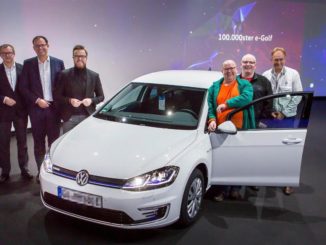
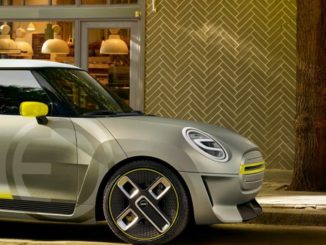
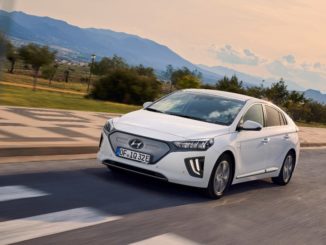
Be the first to comment